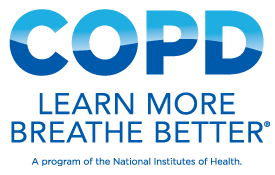 WMed is proud to be a part of the National Heart, Lung, and Blood Institute (NHLBI) Breathe Better Network. Since our initial subcontract with NHLBI in 2018, we have been guided by the COPD National Action Plan in bringing awareness and resources to those in our community living with or affected by COPD.
WMed is proud to be a part of the National Heart, Lung, and Blood Institute (NHLBI) Breathe Better Network. Since our initial subcontract with NHLBI in 2018, we have been guided by the COPD National Action Plan in bringing awareness and resources to those in our community living with or affected by COPD.
What is COPD?
Chronic Obstructive Pulmonary Disease (COPD) is a serious lung disease that many people may have without knowing it. It is also sometimes called emphysema or chronic bronchitis. COPD damages the parts of your lungs that allow you to breathe in oxygen and breathe out carbon dioxide, making you feel short of breath. Sometimes, COPD also causes your lungs to make too much mucus (sometimes called ‘phlegm’ or ‘sputum’), which can make you cough a lot. It is one of the leading causes of death and disability in Kalamazoo County and the United States.
Because COPD makes it harder for you to breathe, it can affect every part of your life. Many people with COPD have trouble going to work, doing things with friends and family, even washing up and getting dressed.
Could I have COPD?
Smoking is the most common cause of COPD. Even if you have not smoked for many years, the damage may already be done. COPD can develop slowly, and you may not notice symptoms until your 40s, 50s, or 60s. Many former smokers think they are getting more short of breath because they are getting older or they need more exercise, when it is actually because of COPD.
About 1 in 5 people with COPD have never smoked. Being exposed to other types of pollution, including secondhand smoke, dust and fumes at work, or chemicals can also cause COPD. Some people can get COPD because of a problem with their genes that causes lung damage.
Because not everyone knows about the early symptoms of COPD, or all of the things that put you at risk, only about half of all people with COPD get diagnosed. Because COPD can feel like other lung diseases, many other people are not diagnosed correctly.
What should I do?
While there is no cure for COPD yet, there are effective treatments that can help you put up with your symptoms and breathe a little easier. It is never too late to get diagnosed, but the earlier, the better. If you think you might have COPD symptoms, especially if you have ever smoked or lived/worked around pollution, you should talk to your provider about getting tested for COPD. The best test for COPD is called spirometry, which measures how well air gets into and out of your lungs. This test only takes a few minutes, and can often be done right in your health care provider’s office. If you do not have a regular health care provider, call our clinic and we will get you started with one of our physicians.
Once you have been diagnosed, your provider will work with you to create a plan to manage your symptoms. This plan might include medications, exercise, dietary advice, or other therapies. If you are a smoker, the best thing you can do to help your lungs is to quit smoking. There are many resources available to help you quit, including the Michigan Quit Line at 1.800.QUIT.NOW (1.800.784.8669) or 1.855.DEJELO-YA (1.855.335.35692). Additional information is available online at https://michigan.quitlogix.org/en-US/. Our WMed Health practices also provide information, nicotine replacement therapy, and other methods to help you kick the habit successfully.
For more information, visit COPD.nhlbi.nih.gov, the website for the National Heart, Lung, and Blood Institute’s COPD Breathe Better® program.

